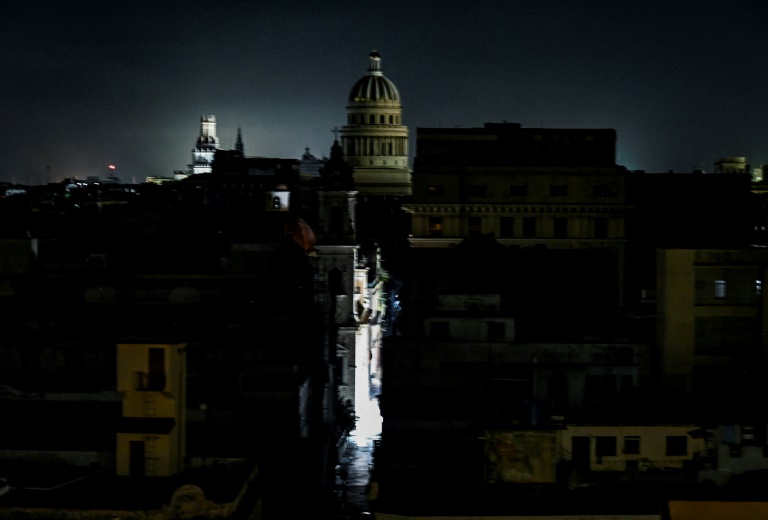Cuba's National Capitol building is seen during a blackout in Havana on September 27, 2022 after the entire island was left in the dark when Hurricane Ian damaged the electrical grid
Havana resident Maykel was helping his friend fix an “almendron” — as the decades-old American cars that ply Cuba’s streets are known — when the lights suddenly cut out late Tuesday.
He and his friend were among the 11 million Cubans plunged into darkness after powerful Hurricane Ian tore across the island’s west, damaging the electrical grid and causing a nationwide blackout.
“What are we going to do?” Maykel, 35, said dryly. “Survive.”
Lazaro Guerra, technical director of the state utility Union Electrica, said in televised remarks that there was no electric service “in any part of the country.”
The energy ministry noted it was dealing with “exceptional circumstances” and that power would be restored gradually.
Communist-ruled Cuba had already been dealing with electricity generation issues stemming from the obsolescence of its plants, breakdowns and maintenance, and heightened demand thanks to the summer heat.
Guerra said the latest problems were affecting the lines linking the country’s west, center and east, and that fluctuations in the charge and electrical frequency were causing instability.
“The western region has the additional complication of having a group of transmission lines that are out of service precisely because of the passing of Hurricane Ian,” he said.
The storm, which hit the provinces of Pinar del Rio, Artemisa and Havana, toppled trees into roadways and fuelled heavy ocean swells that inundated streets around the capital’s popular Malecon promenade.
State media reported that two people were killed Tuesday in Pinar del Rio.
– Completely in the dark –
Harold Baez, a 27-year-old security guard for the half-century-old Coppelia ice cream parlour in the heart of Havana, said he was concerned about the situation but determined to carry on.
“A (nationwide) blackout like that always generates uncertainty, but that’s normal. You have to overcome everything,” he said as he headed for the cafeteria of the Habana Libre hotel which, like many accommodations aimed at international tourists, still enjoyed power thanks to generators.
In Cuba, few homes have gasoline-powered generators, though hospitals, offices and public institutions often do.
Some homes were lit up with candles or rechargeable lamps.
But without streetlights or even traffic signals to illuminate their neighborhoods, many of those living in central Havana found themselves completely in the dark.
“We came out because of the child… because he was going crazy” crying, said one woman who declined to be named as she soothed her baby by the light of her husband’s cell phone.
Restaurant worker Yoelmis Martinez, 36, sought to put an optimistic spin on the situation.
“It isn’t that (we want) it to turn out like this, but… the positive part is that at least we can save a fair bit during this blackout,” Martinez said as she returned home from a friend’s house where she rode out the storm.









